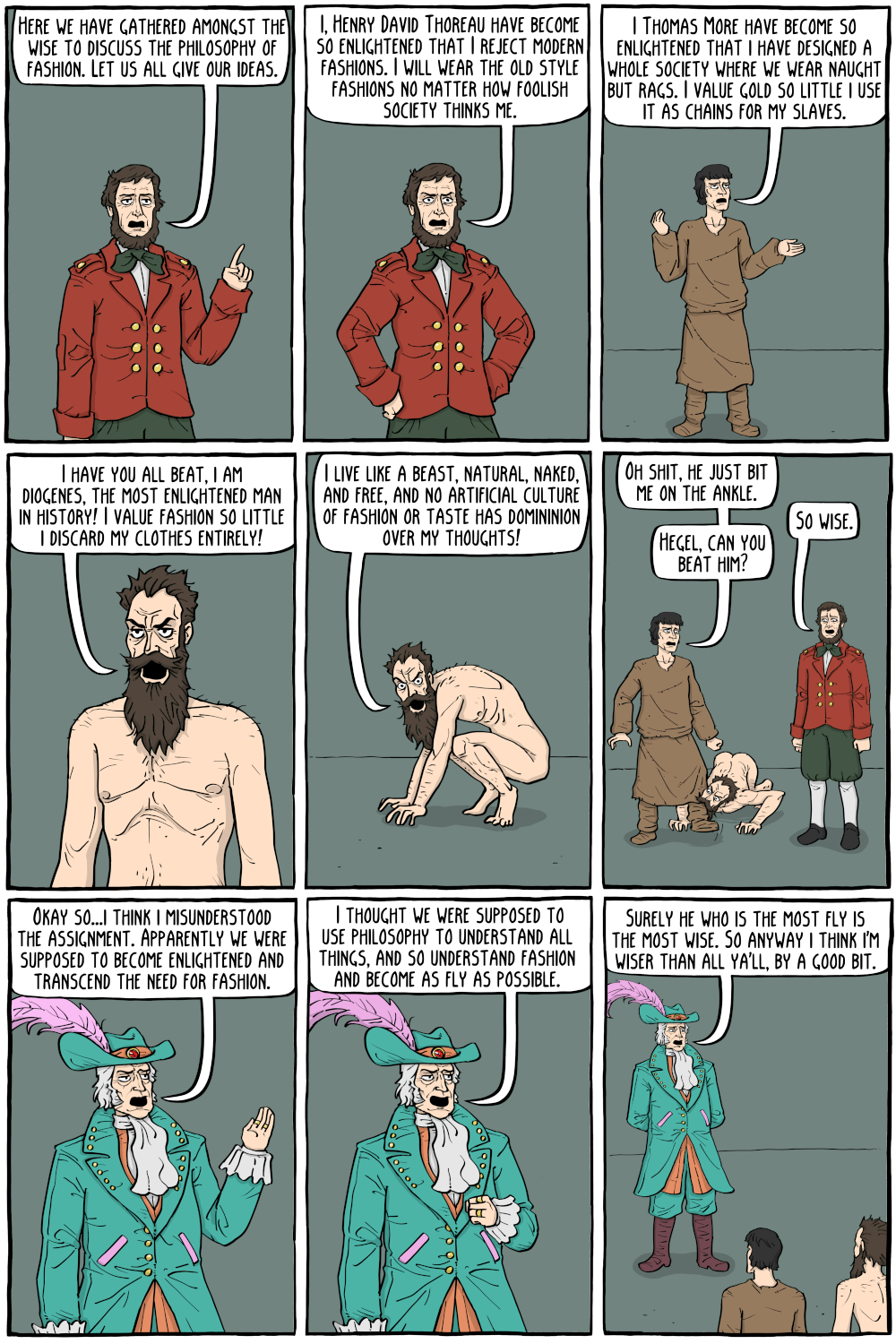
723
The Philosophy of Fashion

Many philosophers throughout the ages have pointed out that fashion is superficial and constantly changing. Probably the most banal and obnoxious thing a philosopher can possibly point out. Thoreau, who might be the most obnoxious of all time, wisely said things like:
I say, beware of all enterprises that require new clothes ... When I ask for a garment of a particular form, my tailoress tells me gravely, "They do not make them so now," not emphasizing the "They" at all, as if she quoted an authority as impersonal as the Fates ... We worship not the Graces, nor the Parcae, but Fashion. She spins and weaves and cuts with full authority. The head monkey at Paris puts on a traveler's cap, and all the monkeys in America do the same.
Five years in the woods well spent, my dude, you've discovered that styles change. Sorry if people told you your weird neckbeard is "out of style" but that's just a polite way to say that no one in any era ever would have thought it looked good.
Thomas More is a bit more interesting, but equally annoying and sanctimonious. He imagines a perfect society in one in which everyone is so wise that they dress as badly as possible at all times. They don't even bother with nice clothes (because they are so busy reading philosophy all the time) and their only use for gold is to us it as chains.
Diogenes is the most interesting for sure, and the most extreme. Where the others give the very easy idea of "boo fashion, it is superficial, not like us!", Diogenes eschews all culture entirely. He strips down main to his "natural" self. No clothes. No civilization. He claims that to live best is to live as the animals do, with our natural instincts.
Hegel didn't talk about fashion much, of course, but when he did he treated it relatively the same as he did everything else. He remarked how fashion, like many other areas of society, undergoes predictable world historical arcs. For example, primitive tribes don't wear any clothes. Then as civilization progresses they put on and more clothes, until a certain point is reached and they start taking off more clothes again. The arc of history creates women's modesty, then slowly removes it. It creates highly formal outfits, then slowly becomes more casual.
I think it's reasonable to think that for Hegel, fashion knowledge producing like anything else, and in the end of history, when the full arc of philosophy comes to its conclusion and all knowledge has been gained, the philosophers of the future will not eschew fashion, but have full mastery and knowledge of it. In other words they will dress cool as hell.
Many philosophers throughout the ages have pointed out that fashion is superficial and constantly changing. Probably the most banal and obnoxious thing a philosopher can possibly point out. Thoreau, who might be the most obnoxious of all time, wisely said things like:
I say, beware of all enterprises that require new clothes ... When I ask for a garment of a particular form, my tailoress tells me gravely, "They do not make them so now," not emphasizing the "They" at all, as if she quoted an authority as impersonal as the Fates ... We worship not the Graces, nor the Parcae, but Fashion. She spins and weaves and cuts with full authority. The head monkey at Paris puts on a traveler's cap, and all the monkeys in America do the same.
Five years in the woods well spent, my dude, you've discovered that styles change. Sorry if people told you your weird neckbeard is "out of style" but that's just a polite way to say that no one in any era ever would have thought it looked good.
Thomas More is a bit more interesting, but equally annoying and sanctimonious. He imagines a perfect society in one in which everyone is so wise that they dress as badly as possible at all times. They don't even bother with nice clothes (because they are so busy reading philosophy all the time) and their only use for gold is to us it as chains.
Diogenes is the most interesting for sure, and the most extreme. Where the others give the very easy idea of "boo fashion, it is superficial, not like us!", Diogenes eschews all culture entirely. He strips down main to his "natural" self. No clothes. No civilization. He claims that to live best is to live as the animals do, with our natural instincts.
Hegel didn't talk about fashion much, of course, but when he did he treated it relatively the same as he did everything else. He remarked how fashion, like many other areas of society, undergoes predictable world historical arcs. For example, primitive tribes don't wear any clothes. Then as civilization progresses they put on and more clothes, until a certain point is reached and they start taking off more clothes again. The arc of history creates women's modesty, then slowly removes it. It creates highly formal outfits, then slowly becomes more casual.
I think it's reasonable to think that for Hegel, fashion knowledge producing like anything else, and in the end of history, when the full arc of philosophy comes to its conclusion and all knowledge has been gained, the philosophers of the future will not eschew fashion, but have full mastery and knowledge of it. In other words they will dress cool as hell.
Permanent Link to this Comic: https://existentialcomics.com/comic/618
Support the comic on Patreon!









